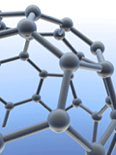
Annual Review of Analytical Chemistry
Scope & Guideline
Empowering Researchers with Cutting-Edge Insights
Introduction
Aims and Scopes
- Analytical Method Development:
The journal emphasizes the development of innovative analytical methods, including novel techniques in mass spectrometry, chromatography, and electrochemistry, aimed at improving sensitivity, specificity, and resolving power. - Application in Biological Systems:
A core focus is the application of analytical chemistry in biological contexts, such as proteomics, metabolomics, and diagnostics, reflecting the interplay between chemistry and life sciences. - Nanotechnology and Sensing Technologies:
The journal showcases advancements in nanotechnology, particularly in the context of biosensors and point-of-care diagnostics, highlighting new materials and devices that enhance analytical capabilities. - Interdisciplinary Approaches:
It promotes interdisciplinary research that combines analytical chemistry with fields like materials science, bioengineering, and information technology, fostering innovation and collaboration. - Environmental and Forensic Applications:
The journal covers analytical methodologies applied to environmental monitoring and forensic science, focusing on the detection of pollutants, toxins, and other analytes of concern.
Trending and Emerging
- Electrochemical and Nanotechnology Applications:
There is a notable increase in research related to electrochemical methods and their applications in nanotechnology, particularly in biosensing and point-of-care diagnostics, indicating a growing interest in these advanced analytical strategies. - Integration of AI and Machine Learning:
The incorporation of artificial intelligence and machine learning into analytical methodologies is on the rise, optimizing data analysis and enhancing the capabilities of various analytical techniques. - Multi-Omics Approaches:
The trend towards multi-omics approaches, integrating genomics, proteomics, and metabolomics, is emerging significantly, enabling comprehensive biological insights and advancing personalized medicine. - Portable and Miniaturized Analytical Devices:
There is an increasing focus on the development of portable and miniaturized analytical devices, reflecting a demand for field-deployable technologies that provide rapid and reliable results in diverse environments. - Environmental and Health Monitoring Technologies:
Research targeting innovative analytical methods for monitoring environmental pollutants and health-related biomarkers is gaining prominence, highlighting the journal's commitment to addressing global challenges.
Declining or Waning
- Traditional Techniques in Isolation:
There is a noticeable reduction in publications focusing solely on traditional analytical techniques without integration of novel technologies or interdisciplinary approaches, suggesting a move towards more innovative methodologies. - Chemical Analysis of Conventional Samples:
Research centered on conventional sample types and basic chemical analyses has decreased, possibly due to the increasing focus on complex biological and environmental samples that require advanced techniques. - Basic Education in Analytical Chemistry:
Discussions surrounding foundational educational techniques in analytical chemistry seem to be waning, as the field increasingly emphasizes emerging technologies and applications rather than traditional pedagogical approaches. - Static Analytical Techniques:
Static methods that do not incorporate real-time or dynamic analysis are becoming less frequent, reflecting a broader trend towards methods that enable continuous monitoring and real-time data acquisition.
Similar Journals

Acta Chemica Iasi
Your Gateway to High-Quality Chemical ResearchActa Chemica Iasi is a distinguished open-access journal dedicated to advancing the field of chemistry, published by the esteemed ALEXANDRU IOAN CUZA UNIVERSITY PRESS located in Iasi, Romania. Since its inception, this journal has served as a vital platform for the dissemination of significant research findings, theoretical advancements, and methodological innovations in various chemistry disciplines. As an open-access publication since 2013, it provides unrestricted access to high-quality articles, fostering collaboration and knowledge sharing among researchers, professionals, and students globally. Although specific metrics such as H-Index and Scopus rankings may be forthcoming, the journal's commitment to rigor and excellence ensures that it remains an invaluable resource for those seeking to stay at the forefront of chemical research. With a focus on promoting scientific inquiry and innovation, Acta Chemica Iasi continues to uphold a legacy of scholarly excellence and contribution to the chemical sciences.

CHINESE JOURNAL OF ANALYTICAL CHEMISTRY
Advancing Analytical Excellence in ChemistryCHINESE JOURNAL OF ANALYTICAL CHEMISTRY, published by SCIENCE PRESS in China, stands as a prominent platform in the field of analytical chemistry since its inception in 1989. With its ISSN 0253-3820 and E-ISSN 1872-2040, the journal maintains a vital role in disseminating empirical research and innovative methodologies, contributing to the advancement of analytical techniques and their applications. The 2023 Scopus ranking positions the journal in the third quartile (Q3) within its category, reflecting a respectable standing among its peers. Researchers, professionals, and students alike engage with a broad range of topics, from instrumental analysis to environmental monitoring, each aiming to foster further scientific inquiry. Although it does not currently offer Open Access, the journal's rich repository of knowledge continues to be an essential resource for those in the analytical chemistry community, with an enduring commitment to scientific excellence and collaboration.
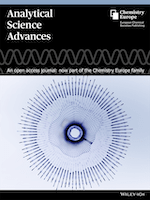
Analytical Science Advances
Leading the Charge in Analytical Method DevelopmentAnalytical Science Advances is a dynamic journal published by WILEY, dedicated to the ever-evolving field of analytical chemistry. With an ISSN of 2628-5452, this open-access platform aims to disseminate high-quality research and insightful reviews that push the boundaries of analytical methodologies and instrumentation. Since its inception in 2020, the journal has gained traction, securing a commendable Q2 ranking in 2023 within its category, highlighting its significance in the scientific community. Currently positioned at Rank #68 out of 156 in Scopus' analytical chemistry category, it boasts a 56th percentile ranking, reflecting its contributions to advancing analytical techniques. Researchers, professionals, and students will find this journal an invaluable resource for keeping abreast of the latest developments, emerging technologies, and innovative approaches in analytical science, ensuring the journal's relevancy and influence in shaping future discoveries.
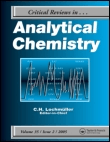
CRITICAL REVIEWS IN ANALYTICAL CHEMISTRY
Fostering Collaboration and Innovation in Analytical Research.Critical Reviews in Analytical Chemistry, published by Taylor & Francis Inc, stands as a pivotal journal in the field of analytical chemistry, contributing significantly to its advancement since its inception in 1989. With an impressive Q1 ranking in the 2023 analytical chemistry category, it positions itself among the top 15 journals in the field, reflecting its high impact and relevance, as evidenced by a 90th percentile Scopus rank. This esteemed journal is dedicated to publishing comprehensive reviews that synthesize current research and emerging methods in analytical techniques, making it an invaluable resource for researchers, professionals, and students alike. With the goal of fostering innovation and collaboration, Critical Reviews in Analytical Chemistry continues to address challenges and breakthroughs within the sphere of analytical methodologies, ensuring its authors and readers remain at the forefront of scientific discovery.

ANALYTICAL AND BIOANALYTICAL CHEMISTRY
Driving Excellence in Bioanalytical MethodologiesANALYTICAL AND BIOANALYTICAL CHEMISTRY, published by SPRINGER HEIDELBERG, is a leading international journal that serves as a vital platform for innovative research in the fields of analytical and bioanalytical chemistry. With an impressive impact factor and ranking in the Q2 category for both Analytical Chemistry and Biochemistry, the journal highlights key advancements and methodologies that drive the discipline forward. Established in 1996 and continuing vigorously into 2024, it has gained significant recognition with Scopus rankings placing it in the 83rd and 78th percentiles within its categories, underscoring its impact and relevance. The journal's commitment to open access facilitates widespread dissemination of critical scientific knowledge, making it an essential resource for researchers, professionals, and students dedicated to exploring the complexities of chemical analysis. With its base in Heidelberg, Germany, ANALYTICAL AND BIOANALYTICAL CHEMISTRY continues to inspire and influence the global research community.
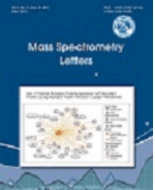
Mass Spectrometry Letters
Unveiling the Future of Mass Spectrometry Research.Mass Spectrometry Letters is a pioneering open-access journal published by the Korean Society for Mass Spectrometry, specializing in the diverse fields of analytical chemistry, biochemistry, and spectroscopy. Established in 2010, this journal aims to disseminate groundbreaking research and advancements in mass spectrometry and its applications across various scientific domains. Though currently categorized in the Q4 quartile in key analytical fields, Mass Spectrometry Letters serves as an essential platform for researchers, professionals, and students to share innovative methodologies, emerging trends, and practical applications of mass spectrometry, thus fostering collaboration and advancing knowledge in the scientific community. With a commitment to open access, articles published since 2010 are readily available, enabling widespread distribution and engagement within the international research community. Located in Daejeon, South Korea, and actively converging research through 2024, the journal holds the potential to grow its impact and relevance within the dynamic landscape of mass spectrometry.

Separation Science Plus
Fostering knowledge exchange in analytical advancements.Separation Science Plus is an emerging academic journal dedicated to advancing the field of analytical chemistry and separation science. Published by WILEY-VCH Verlag GmbH, this journal provides a platform for researchers to disseminate high-quality studies and reviews that address innovative techniques and breakthroughs in separation methodologies. With its ISSN 2573-1815, the journal has made significant inroads since its inception in 2018, encompassing a convergence period until 2024. Despite currently holding a Q3 ranking in Analytical Chemistry and a Q4 ranking in Filtration and Separation, its dedication to publishing impactful research makes it a vital resource for professionals and students alike. The journal operates under the robust scholarly reputation of WILEY, which is known for its commitment to excellence in scientific communication. Researchers interested in the latest advancements in separation techniques will find Separation Science Plus an essential read, fostering the exchange of knowledge and facilitating greater understanding within this specialized field.
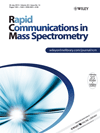
RAPID COMMUNICATIONS IN MASS SPECTROMETRY
Pioneering applications in analytical chemistry.RAPID COMMUNICATIONS IN MASS SPECTROMETRY is a leading journal published by Wiley, focusing on the rapidly evolving field of mass spectrometry and its applications across various domains, including analytical, organic, and spectroscopy chemistry. With its ISSN 0951-4198 and an E-ISSN of 1097-0231, the journal has firmly established itself as a reputable source of innovative research since its inception in 1987, and is set to continue until 2024. As evidenced by its 2023 Scopus rankings, the journal occupies a solid position in the realms of analytical chemistry (Q3), organic chemistry (Q3), and spectroscopy (Q3), reflecting its impact among a diverse audience of researchers and professionals. Although it is not an open-access publication, the findings shared within its pages are pivotal for advancing knowledge and practical applications in mass spectrometry, making it an essential resource for students and experts aiming to stay abreast of the latest scientific developments.

MICROCHEMICAL JOURNAL
Catalyzing Progress in Microchemical MethodologiesMicrochemical Journal, published by Elsevier, stands as a leading scholarly publication in the fields of Analytical Chemistry and Spectroscopy, boasting impressive rankings of Q1 and Q2 in their respective categories for 2023. With an H-index reflecting its substantial impact and relevance, this journal has been a cornerstone of research dissemination since its inception in 1957, and it continues to play a vital role in advancing the methodological and technological innovations within these disciplines. The journal presents peer-reviewed articles that explore a wide array of topics, making it an essential resource for researchers, professionals, and students keen on the latest advancements in microchemical processes and techniques. Although it does not currently offer open access options, its publication through Elsevier ensures a high standard of academic integrity and wide accessibility through various academic institutions. With a strong Scopus ranking—9th in Chemistry Spectroscopy and 22nd in Analytical Chemistry—Microchemical Journal is an indispensable platform for empirical studies, insightful reviews, and pioneering methodologies in the microchemical domain.
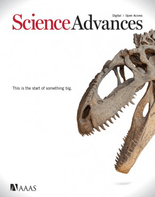
Science Advances
Fostering Collaboration for Global Scientific ProgressScience Advances, published by the American Association for the Advancement of Science, is a leading open-access journal in the field of multidisciplinary sciences. Since its inception in 2015, it has rapidly gained prominence, achieving a remarkable Q1 ranking in both Medicine (miscellaneous) and Multidisciplinary categories, underlining its impact and relevance in contemporary research. With an impressive Scopus ranking of #7 out of 171 in the Multidisciplinary field, it proudly sits in the 96th percentile, showcasing its dedication to disseminating high-quality research across various scientific domains. This journal not only provides open access to innovative findings but also aims to foster collaboration and maintain a high standard of scholarly communication among researchers, professionals, and students globally. Stay updated with some of the most groundbreaking advancements and contribute to the collective pursuit of scientific knowledge through Science Advances.